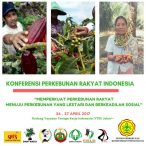
JAKARTA, INDONESIA–The Advocacy Alliance for Smallholders Plantation Justice which include farmers organizations in Indonesia namely Indonesia Peasant Alliance (API), Indonesia Farmer Union (SPI), Indonesia Farmer and Fisheries Community Union (WAMTI) and IPPHTI, in cooperation with National CSOs and NGOs namely Palm Oil Farmer union (SPKS), Sawit Wach, Indonesia Human Right Committee for Social Justice (IHCS), BINADESA, and FIELD, held a national conference aimed to strengthen smallholders plantation toward sustainable plantation and social justice on 26-27 April 2017 at YTKI, Jakarta, Indonesia.

According to Henri Saragih, Steering Committee Coordinator, the conference is an initiative from farmers as smallholders plantation. The objective of the conference is to respond to problems faced by national plantations, to encourage the role of government and the presence of state to realize social justice in the plantation sector.
H.S Dillon, one of the figures of human rights and social economic in Indonesia and the president’s special envoy for poverty alleviation (2011-2014), said, “lameness in plantation sector have long caused various injustice problems and marginalized Indonesian people works in plantation sector since colonial government era until the new order government. Although the old order government has conducted nationalization and issued the Main Laws of Agrarian Reform 1960, the new order Government goes back to policy on plantation regulation system like the colonial model.”
“All this time, large-scale plantations have long caused various violations, lameness, and it does not provide benefit for smallholder plantations. After reformation, major plantation companies were increasingly dominant amid community lawsuit on rainforest damage, injustice of the agrarian resources access, agrarian conflict, hunger and malnutrition and other problems,” said Muhammad Rifai who lead the group discussion.
Mansuetus Darto, SPKS President, said, “Currently, there are several programs for palm oil plantation improvement through Indonesia Sustainable Palm Oil (ISPO) in the national level, Roundtable Sustainable Palm Oil (RSPU) in the international level, and have also established Fund Management Agency for Palm Oil Plantation (BPDP). However, it does not impact to solve problems faced by the plantation sector and small holder farmers, so smallholder plantations were marginalized and unable to rise to build self-reliance.”
In the conference, participants and delegations from various provinces in Indonesia discussed several issues related to deforestation, economic lamenee to smallholders’ farmer around plantation, agrarian conflict, and environment degradation, as well as problems faced by smallholders’ plantation including low productivity, long distribution chain, monopoly by big companies, low prices, low capital, low support to plant rejuvenation and low protection and empowerment for smallholders plantation.
“Regulation for national plantation governance should provide solutions for social justice, preserving the environment, contributing to poverty alleviation and strengthening the smallholders plantation,” said Nur Hadi of Indonesia Peasant Alliance, during his closing statement.

The achieved results of Indonesia Smallholders Plantation Conference are:
- formulation of platform by several organizations and local smallholders plantation organization to increase sustainable smallholders plantation and social justice,
- empowerment of smallholders plantation as subject that can transform sustainable production, appropriate technology, market access, access to credit,
- protect farmer rights as smallholders plantation, women, and plantation workers, and,
- strengthening support from CSOs, university, community leaders, indigenous peoples, public figures, and goverment.
Aside from local farmer leaders, members of national farmer organizations, CSOs, the event was attended by the Ministry of Agraria and spatial, Ministry of Agriculture, Ministry of Village, head of Geospatial Information Body, National Planning Body (BAPPENAS), andFund Management Body for Palm Oil Plantation. ### (Report by Rifai, API)

Comments are closed